1 . Everyone gathered around and Paddy read out loud, slowly, his tone growing sadder and sadder. The little headline said: BOXER RECEIVES LIFF SENTENCE.
Frank Cleary, aged 26, professional boxer, was today found guilty of the murder of Albert Gumming, aged 32, laborer, last July. The jury (陪审团) reached its decision after only ten minutes, recommending the most severe punishment to the court. It was, said the Judge, a simple case. Cumming and Cleary had quarreled violently at the Harbour Hotel on July 23rd and police saw Cleary kicking at the head of the unconscious Gumming. When arrested, Cleary was drunk but clear-thinking.
Cleary was sentenced to life imprisonment with hard labour. Asked if he had anything to say, Cleary answered, “Just don’t tell my mother.”
“It happened over three years ago,” Paddy said helplessly. No one answered him or moved, for no one knew what to do. “Just don’t tell my mother,” said Fee numbly (麻木地). “And no one did! Oh, God! My poor, poor Frank!”
Paddy wiped the tears from his face and said. “Fee, pack your things. We’ll go to see him.”
She half-rose before sinking back, her eyes in her small white face stared as if dead. “I can't go,” she said without a hint of pain, yet making everyone feel that the pain was there. “It would kill him to see me. I know him so well — his pride, his ambition. Let him bear the shame alone, it’s what he wants. We’ve got to help him keep his secret. What good will it do him to see us?”
Paddy was still weeping, not for Frank, but for the life which had gone from Fee’s face, for the dying in her eyes. Frank had always brought bitterness and misfortune, always stood between Fee and himself. He was the cause of her withdrawal from his heart and the hearts of his children. Every time it looked as if there might be happiness for Fee, Frank took it away. But Paddy’s love for her was as deep and impossible to wipe out as hers was for Frank.
So he said, “Well, Fee, we won’t go. But we must make sure he is taken care of. How about if I write to Father Jones and ask him to look out for Frank?”
There was no excitement in the eyes, but a faint pink stole into her cheeks. “Yes, Paddy, do that. Only make sure he knows not to tell Frank we found out. Perhaps it would ease Frank to think for certain that we don’t know.”
1. Paddy cried because he thought ________.| A.what had happened to Frank was killing Fee |
| B.Frank should have told Fee what had happened |
| C.Frank did kill someone and deserved the punishment |
| D.Frank had always been a man of bad moral character |
| A.Fee was so heart-broken that she could hardly stand up |
| B.Fee didn’t want to upset Paddy by visiting Frank |
| C.Fee struggled between wanting to see Frank and respecting his wish |
| D.Fee couldn’t leave her family to go to see Frank |
| A.The jury and the judge agreed on the Boxer’s Sentence of Life Imprisonment. |
| B.Frank didn’t want his family to know the sentence to him, most probably out of his pride. |
| C.The family didn’t find out what had happened to Frank until 3 years later. |
| D.The police found Gumming unconscious, heavily struck by Frank. |
| A.Frank is Fee’s son and Paddy is Fee’s brother. |
| B.Frank is Fee’s lover and Paddy is Fee’s husband. |
| C.Frank is Fee’s brother and Paddy is Fee’s lover. |
| D.Frank is Fee’s son and Paddy is Fee’s husband. |
I had a rather busy day yesterday, ironic(具有讽刺意义的) for someone who is unemployed right now. In the morning I went to the gym, and unsuccessfully got the phone call from the unemployment office for some job searching. Before I knew it, it was noon. I grabbed a quick lunch and rushed down to a meeting. On my way to Connecticut, I wondered if I would see someone that I would feel forced to give my first $10 to. I was running late and decided to do it afterwards.
After the meeting I had about half an hour to find the first person of my Year of Giving! I decided to check out Dupont Circle. I had met a guy there named Jerry once and thought he would willingly accept my first $10. He wasn’t there, but I did see a man sitting by himself who looked really lonely, so I approached him. Now I had to figure out what I was going to say. I think I said something like, “Hi, can I sit down here?” “I would like to know if I could give you $10?” He asked me to repeat what I had said. I did, then he looked at me funny, got up and left.
I then started walking south where I spotted a man standing by the bus stop on Connecticut Ave. He appeared to be in his 60s. I don’t know what drew me to him, but I thought I would make my second attempt. I was a bit nervous and asked him which bus came by that stop. Then I explained that I was starting a year-long project to give $10 to someone every day and that I wanted to give my $10 for today to him. The gentleman, I later found out that his name was Ed, responded without hesitation that he could not accept my offer and that there were many people more deserving the money than him. This was exactly one of the things that I hoped would happen. People would think of others before themselves!
1. The author set the starting date on December 15 to .
| A.help the charity |
| B.remember his mother |
| C.make an exploration |
| D.fulfill a wish of his mum |
| A.he was considered ridiculous |
| B.he hesitated for a long time |
| C.he was forced to donate the money |
| D.he had no time to take action |
| A.he didn’t need others’ help |
| B.he thought more for others |
| C.he didn’t care about money |
| D.he wanted to get more money |
| A.true friendship | B.his own kindness |
| C.generous donations | D.human’s good nature |
The Hermitage Museum
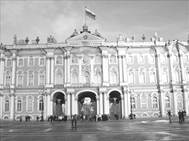
The Hermitage Museum is one of the most important sights to see for any visitor to St. Petersburg. There you can see lots of different paintings of old masters inside the Hermitage. Prepare to come face-to-face with classic Western artists.
The Russian Museum
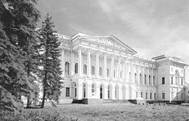
The Russian Museum holds one of the largest collections of Russian art in the world. View Russian art creations through the ages, from Byzantine (拜占庭)-style icons to the Socialist Realism of Stalin’s times.
Kizhi Island
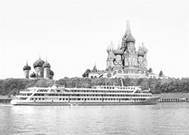
Kizhi Island is an open-air museum of wooden buildings from the Karelia Region of Russia. These impressive structures are made without any nails (钉子) — the wood fits together with joints and grooves (沟槽).
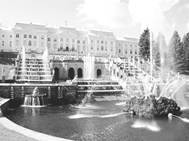
Peterhof

Peterhof is as beautiful as it is fun. You’ll be charged for admission (门票), but go to Peterhof when the fountains (喷泉) are working — during the day in the summer. They are shut off in winter as well as in the evenings.
The Church of Our Savior on Spilled Blood
Love it or hate it, the Church of Our Savior on Spilled Blood is an attractive must-see sight. The beautiful look may make your eyes brighten, and the paintings inside the church will make you say “Wow!”
The Bronze Horseman Statue
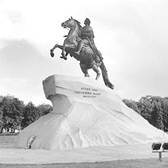
The Bronze Horseman is a part of Russian Culture and a symbol of St. Petersburg. Made famous by Alexander Pushkin (普希金), this statue of Peter the Great sitting on his horse can truly show Peter the Great’s influence on the Russian idea of greatness.
1. If you’re interested in paintings, you’d better go to _____.
| A.the Hermitage Museum and Peterhof |
| B.the Hermitage Museum and the Church of Our Savior on Spilled Blood |
| C.Kizhi Island and the Church of Our Savior on Spilled Blood |
| D.the Russian Museum and Kizhi Island |
| A.Peter the Great | B.Alexander Pushkin |
| C.Byzantine | D.Stalin |
| A.The fountains in Peterhof can be seen all year round. |
| B.The largest collection of Russian art is in the Hermitage Museum. |
| C.The buildings on Kizhi Island are made of wood. |
| D.You can visit Peterhof free of charge. |
| A.show the wonderful history of Russia |
| B.introduce the famous buildings in Russia |
| C.persuade artists to study St. Petersburg |
| D.attract tourists to visit St. Petersburg |
One morning, in addition to his usual lunch bag, Molly handed him a second paper bag.This one was worn and held together with staples (订书钉) .
“Why two bags?” her father asked.“The other is something else,” Molly answered.“What’s in it?” “Just some stuff.Take it with you.”Not wanting to discuss the matter, he put both bags into his briefcase, kissed Molly and rushed off.At midday he opened Molly’s bag and took out the contents: two hair ribbons(丝带), three small stones, a plastic dinosaur, a tiny sea shell, a small doll, and 13 pennies… The busy father smiled, finished eating, and swept the desk clean into the wastebasket, Molly’s stuff included.
That evening, Molly ran up behind him as he read the paper.“Where’s my bag?” “What bag?” “The one I gave you this morning.” “I left it at the office.Why?” “I forgot to put this note in it,” she said.“And, besides, Daddy, the things in the sack are the things I really like — I thought you might like to play with them.You didn’t lose the bag, did you, Daddy?” “Oh, no,” he said, lying.“I just forgot to bring it home.I’ll bring it tomorrow.” While Molly hugged her father’s neck, he unfolded the note that read: “I love you, Daddy.” Molly had given him her treasures — all that a 7-year-old held dear.
Love in a paper bag, and he missed it — not only missed it, but had thrown it in the wastebasket.So back he went to the office.Just ahead of the night janitor(看门人), he picked up the wastebasket.He put the treasures inside and carried it home carefully.The bag didn’t look so good, but the stuff was all there and that’s what counted.
After dinner, he asked Molly to tell him about the stuff in the sack.It took a long time to tell.Everything had a story or a memory.
“Sometimes I think of all the great times in this sweet life,” he thought.
We should all remember that it’s not the destination that counts in life, but the journey.That journey with the people we love is all that really matters.It is such a simple truth but it is so easily forgotten.
1. Why did Molly give her father a second bag?
| A.She didn’t want to keep the things in the bag. |
| B.She hoped those things would bring happiness to her father. |
| C.She wanted to remind her father of the stories behind the things. |
| D.She enjoyed playing with her father. |
| A.He kept it in the drawer. |
| B.He took it back home. |
| C.He threw it into the wastebasket. |
| D.He put it on his table. |
| A.regretful | B.surprised |
| C.sad | D.satisfied |
| A.An important journey | B.Two bags |
| C.Father and daughter | D.Love in a paper bag |
It’s a well-known fact that stress can weaken the immune system. In this study, the researchers sought to determine whether hugs----like social support more broadly ----could protect individuals from the increased sensitivity to illness brought on by the particular stress that come with interpersonal conflict.
“We know that people experiencing ongoing conflicts with others are less able to fight off cold viruses. We also know that people who report having social support are partly protected from the effects of stress on psychological states, such as depression and anxiety, “the study’s lead author, psychologist Dr. Sheldon Cohen , said in a statement. “We tested whether awareness of social support is equally effective in protecting us from sensitivity to infection caused by stress and also whether receiving hugs might partially account for those feeling of support and thus protect a person against infection.”
In the experiment , over 400 healthy adults filled out a questionnaire about their perceived (感知) social support and also participated in a nightly phone interview for two weeks . They were asked the frequency they engaged in interpersonal conflicts and received bugs that day.Z+X+X+K]
Then, the researchers exposed the participants to a common cold virus, and monitored them to assess signs of infection. They found that both perceived social support and more frequent hugs reduced the risk of infection associated with experiencing interpersonal conflict. Regardless of whether or not they experienced social conflicts, infected participants with greater perceived social support and more frequent hugs had less severe illness symptoms.
“This suggests that being hugged by a trusted person may act as an effective means of conveying support and that increasing the frequency of hugs might be an effective means of reducing the effects of stress,” Cohen said. “The apparent protective effect of hugs may result from the physical contact itself or hugging being a behavioral indicator of support and closeness. Either way, those who receive more hugs are somewhat more protected from infection.”
If you need any more reason to go wrap your arms around someone special, consider this: hugs also lower blood pressure, reduce fearsome around death and dying, improve heart health and decrease feeling of loneliness.
1. In Paragraph 1, the underlined words “ward off “can be replaced by ____.
| A.produce | B.increase |
| C.prevent | D.support |
| A.hugs can hide serious illness symptoms |
| B.social conflicts can monitor signs of infection |
| C.social support can reduce the risk of having a cold |
| D.depression and anxiety result from less social support |
| A.hugs can have protective effects |
| B.social support can sure diseases |
| C.interpersonal conflicts cause infections |
| D.stress can weaken our immune system |
| A.a social science magazine |
| B.a commercial brochure |
| C.a medical report |
| D.an academic essay |
But is there any scientific explanation for this obsession? Well, you should probably ask James Kilner, a neuroscientist(神经系统科学家) at University College London.
Through our lifetime we become experts at recognizing and interpreting other people's faces and facial expressions. In contrast, according to Kilner, we have a very poor understanding of our own faces since we have little experience of looking at them ─ we just feel them most of the time.
This has been proved in previous studies, according to the BBC.
Kilner found that most people chose the more attractive picture. This suggests that we tend to think of ourselves as better-looking than we actually are. To further test how we actually perceive our own faces, Kilner carried out another study. He showed people different versions of their own portrait ─ the original, one that had been edited to look less attractive and one that was made more attractive ─ and asked them to pick the version which they thought looked most like them. They chose the more attractive version.
But what does it say about settles? Well, isn't that obvious? Selfies give us the power to create a photograph ─ by taking it from various angles, with different poses, using filters (滤色镜) and so on ─ that better matches our expectations with our actual faces.
"You suddenly have control in a way that you don't have in non-virtual(非虚拟的) interactions," Kilner told the Canada-based CTV News. Selfies allow you "to keep taking pictures until you manage to take one you're happy with" , he explained.
1. What is the passage mainly about?
| A.The definition and fun of taking selfies. |
| B.A study of why people love taking selfies. |
| C.How taking selfies influences people's daily lives. |
| D.How to interpret people's facial expressions in their selfies. |
| A.interpret | B.beautify | C.choose | D.explain |
| A.People interpret others' facial expressions worse than their own. |
| B.People tend to spend more time looking at their faces than at others'. |
| C.People tend to believe they look more attractive than they actually are. |
| D.People who like taking selfies know more about their facial expressions. |
| A.it is a good chance to learn more about their actual faces |
| B.it is a way to respond to others' facial expressions correctly |
| C.it enables them to interact with their friends in social media |
| D.it allows them to satisfy their expectations with their appearances |
It seemed that Katie had been running up sizable charges in the lunchroom. Her parents explained that Katie brought a great homemade lunch each day, and there was no reason for her to buy school lunch. They assumed a sit-down with Katie would solve the problem, but failed. So they asked me to help them get to the bottom of this situation.
So the next day, I asked Katie to my office. "Why are you charging lunches, Katie? What happened to your homemade lunch?" I asked. "I lose it," she responded. I leaned back in my chair and said, "I don't believe you, Katie. " She didn't care. "Is someone stealing your lunch, Katie?" I took a new track. "No. I just lose it," she said. Well, there was nothing else I could do.
The problem was still unsolved the next week when I noticed a boy who was new to the school sitting alone at a lunch table. He always looked sad. I thought I would go and sit with him for a while. As I walked towards him, I noticed the lunch bag on the table. The name on the bag said "Katie".
Now I understood and I talked to Katie. It seemed that the new boy never brought a lunch, and he wouldn't go to the lunch line for a free lunch. He had told Katie his secret and asked her not to tell anyone that his parents wanted him to get a free lunch at school. Katie asked me not to tell her parents, but I drove to her house that evening after I was sure that she was in bed. I had never seen parents so proud of their child. Katie didn't care that her parents and teacher were disappointed in her. But she cared about a little boy who was hungry and scared.
Katie still buys lunch every day at school. And every day, as she heads out of the door, her mom hands her a delicious homemade lunch.
1. What did the author think of Katie?
| A.She performed well at school. |
| B.She was a girl filled with love. |
| C.She often made trouble at school. |
| D.She used to be a discipline problem. |
| A.She lost her homemade lunch. |
| B.She had her homemade lunch stolen. |
| C.She didn't like the taste of her homemade lunch. |
| D.She gave her homemade lunch to a hungry boy. |
| A.They were very angry. | B.They were proud of Katie. |
| C.They were disappointed. | D.They were rather upset. |
| A.Katie was informed that her parents had known her secret. |
| B.Katie told the author the truth of her lunch during their first talk. |
| C.Katie's secret of lunch was discovered by the author by accident. |
| D.Katie stopped buying lunch at school after her secret was discovered. |
Speaking of many of those man-made dangers of the automobile, Arthur W. Galson, professor of biology, said it was possible to make a kerosene-burning turbine car that would “lessensmog by a very large factor”. But he expressed doubt whether Americans were willing to give up moving about the countryside at 90 miles per hour in a large vehicle. “America seems wedded to the motor car—every family has to have at least two, and one has to be a convertible (敞篷汽车) with 300 horsepower,” professor Galson continued. “Is this the way of life that we choose because we treasure these values?”
For professor Sears, part of the blame lies with “a society that regards profit as a supreme value, under the illusion that anything that’s technically possible is, therefore, morally justified”. Professor Sears also called the country’s dependence on its modern automobiles “terrible economics” because of the large horsepower used simply “moving one individual to work”. But he admitted that Americans have painted themselves into a corner by allowing the national economy to become so dependent on the automobile industry.
“The solution,” Dr Weeinerman said, “is not finding a less dangerous fuel but a different system of inner city transportation. Because of the increasing use of cars, public transportation has been allowed to wither (衰弱) and grow worse, so that if you can’t walk to where you want to go, you have to have a car in most cities,” he declared. This, in turn, Dr Weeinerman contended, is responsible for the “arteriosclerosis (动脉硬化)” of public roads, for the pollution of the inner city and for the middle-class movement to the suburbs.
1. The main idea of the passage is that .
| A.Americans are used to travelling by cars |
| B.American public transportation is growing worse |
| C.American car industry caused disastrous road accidents |
| D.American people’s health is threatened by automobiles |
| A.Americans prefer cars to anything else |
| B.Americans are interested in fast automobiles |
| C.kerosene-burning engines cause more problems |
| D.kerosene-burning engines are green transportation |
| A.technology is always good for people |
| B.technology is a sword with two sides |
| C.more attention should be paid to social effects |
| D.US doesn’t care about the environment at all |



